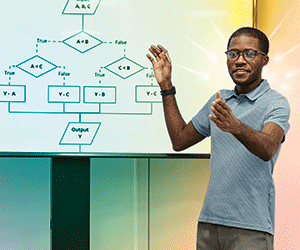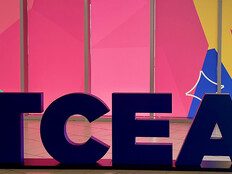From collaboration and professional development to artificial intelligence, here’s how her department is making an impact:
EDTECH: How did the APS instructional technology team plan for the current school year?
RACHELL: Our planning started long before summer. Even in June, our team was reflecting on last year’s work and brainstorming improvements to identify what worked, what didn’t and how to move forward with purpose. We worked closely with the curriculum and instruction department to ensure we were ready to support teachers, and we worked to build a strong culture and climate within our own department. This ensured we weren’t planning in isolation and were instead aligning our work with district priorities.
We also refined how we collect and use feedback from schools. Those changes are already paying off: We’ve surpassed the amount and quality of data we had at this point last year. That information helps us show our impact to leadership and adjust our own practices in real time.
We’re approaching this year with a renewed focus on aligning our work to the district’s 2025-2030 Strategic Plan. That means centering instructional technology on what matters most: strengthening literacy, improving math proficiency and preparing students with future-ready skills such as digital citizenship, AI literacy and collaborative problem-solving. We want students to graduate prepared not only for today’s classrooms but also for tomorrow’s opportunities.
KEEP READING: Prepare students for a tech-driven future with digital fluency.
EDTECH: You’ve shared online that “Undeniable Impact” is a theme for your department this year. How and why did you choose that as a theme?
RACHELL: “Undeniable Impact” emerged as our theme this year because we wanted a phrase that captured both the urgency and the purpose of our work.
Excited to welcome back our team of #edtech Integration Specialists tomorrow!
Our motto for the year is #undeniableimpact w/a focus on the task, not the tool.
Can’t wait to pour into this dynamic team as we bridge the content w/tech to cultivate curiosity in our students! pic.twitter.com/8RnNLab68m— Dr. Natasha Rachell (@apsitnatasha) July 13, 2025
“Undeniable Impact” is both a challenge and a commitment. Our work as the department of instructional technology should leave no question about the value we bring, whether that’s in the way we support schools, the tools we help implement or the professional growth we provide. If our impact can be ignored or overlooked, then we haven’t done our job.
During our leadership retreat, we set the expectation that the theme would guide not only what we accomplish but also how we show up every day as leaders, employees and people. It was important that this wasn’t just a slogan for the department, but a standard that starts with leadership and ripples outward.
EDTECH: How does this theme tie into the work that your department is doing this school year?
RACHELL: Our team is smaller than in previous years, but the number of schools we support hasn’t changed, which means we must be even more intentional about prioritizing, communicating and measuring our impact. The work we do must result in impact that is visible and measurable, because in education, resources and time are precious. Teachers and leaders deserve to see clear results from our investments.
DIVE DEEPER: K–12 districts can optimize their IT budgets with these tips.
“Undeniable Impact” serves as our North Star, guiding every decision and keeping us accountable. You’ll see it everywhere: in our email signatures, tagged in social posts and woven into our professional learning. It’s a constant reminder, to ourselves and to the people we serve, that our work must make a difference that’s visible and lasting.
One example of that commitment is our rollout of Google Workspace for Education Plus for the district and the premium version of Gemini for leaders. We led the implementation and ensured that every leader — in individual schools as well as the central office — had access and training. Leaders are now modeling meaningful, efficient technology use for their schools, and that’s the kind of undeniable impact we expect to build on this year.
EDTECH: What other goals does the instructional technology department have for the 2025-2026 school year?
RACHELL: One of our biggest goals this year is to continue helping our district thoughtfully integrate AI into teaching and learning. We see AI as a powerful partner for educators, not a replacement. Our focus is on showing teachers and leaders how AI can save time, spark creativity and personalize learning, while centering equity, ethics and student safety in our work.
MORE ON EDTECH: Experts share how to best embrace artificial intelligence in schools.
We’ve already introduced tools that give teachers practical, classroom-ready ways to design lessons, streamline planning and better support students. Now, our focus is on continued professional learning so that teachers don’t just have access to these tools but truly feel empowered to use them in ways that improve outcomes for students.
Ultimately, we want AI to feel less like a buzzword and more like a natural, everyday support for teaching and learning. By leading this work, we’re helping our district stay ahead while ensuring the “why” of AI always comes before the “how.”
EDTECH: How do you approach the integration of technology in the district and as part of your department’s goals?
RACHELL: For the past two years, we’ve grounded our work in the idea of “the task, not the tool.” It’s never about pushing technology for technology’s sake. For us, technology isn’t about chasing the newest tool, it’s about delivering that undeniable impact by connecting digital tools to pedagogy, coaching educators in purposeful use and creating meaningful student learning experiences. It’s about understanding the needs of the teachers, administrators or coaches we’re working with and then matching those needs with the right tool.
That means we start every conversation by asking, “What are you trying to accomplish?” Once we know the goal, we can recommend the best tool to support it. This approach ensures technology is always a support, not a distraction, and that teachers feel empowered rather than overwhelmed.
Technology’s role this year is best captured in our Instructional Technology Promise, which outlines exactly how technology supports our goals. It’s the bridge that connects our vision to action; it isn’t just part of the plan, it’s the engine that drives our promise forward.
EDTECH: What are you looking forward to this year?
RACHELL: I’m most looking forward to seeing our theme of “Undeniable Impact” come to life in schools. We’ve set the tone as a team, and now I’m excited to watch how that translates into classrooms where teachers feel supported, students feel empowered and technology is being used with real purpose.
RELATED: Unlock the benefits of professional development in K–12 districts.
I’m also looking forward to the alignment with the district’s strategic plan. The goals around literacy, math, and college and career readiness are ambitious, but they give us a clear focus. Knowing that our work in instructional technology is directly tied to those outcomes makes the effort even more meaningful.
There’s also a unique excitement around AI, and APS has positioned itself as a leader among districts by jumping right in. Staff and students are curious about what’s possible, and we’re channeling that momentum into thoughtful, ethical and practical uses of AI that truly support teaching and learning.











